Meeting of the Educational Network for Latin America
FIG Commission 2 WG 2.2 - The Studies of Surveying in Latin
America
San José, Costa Rica, 13–15 April 2004
Introduction
Since 13 to 15 April 2004 there was the yearly meeting of the Educational
Network for Latin America in Costa Rica, arranged by the Colegio de
Ingenieros Topógrafos of Costa Rica.
The idea of creating this Network arose during the Symposium held in
Puerto Rico in 2000 by the Colegio de Ingenieros y Agrimensores de Puerto
Rico (CIAPR) and the Mayagüez University notifying the common problems,
similarities, lacks and needs in most of the countries in Latin America. Mr.
Robert Foster, President of FIG at that time supported the idea and
underlined the need of such a Network. Members to the Network were elected
in Mayagüez representing most of the countries present at the meeting and
members of FIG.
The main goals of this Network are:
- To establish strong links among educational institutions in Latin
America
- To facilitate a free flow and exchange of ideas, projects and people
amongst these institutions
- To facilitate harmonization of curricula, if such is possible and
necessary
- To facilitate a “common educational base”
- To facilitate mobility among professionals, teaching staff and
students
- To improve, when ever necessary, the working conditions for
professionals and to increase work possibilities for graduates
This Network was created in the spirit of becoming a permanent activity,
thus it is not only an occasional working group studying the state of the
art in education in Latin America, but a permanent link among professionals
and educational institutions
The final results of this first step will be given in a final report to
be launched at the FIG regional conference to be held in Latin America in
2005.
The first meeting of the Network was held last year in Córdoba
(Argentina) under the presidency of the WG 2.2 Chair, Prof. Graciela
Loyócano. During this meeting a work plan for the Network was endorsed
together with countries and members which are responsible for each item; and
a questionnaire was designed to be sent to the different associations and
universities. Eight members of the Network attended this three-day meeting.
The Federación Argentina de Agrimensores was represented by its
President Engineer Norberto Fricks. The arrangements of the meeting
and hospitality were excellent offering participants good working
atmosphere.
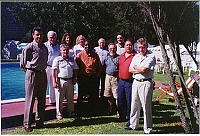
Participants in the first WG 2.2 meeting in Córdoba (Argentina).
The second meeting was held in Costa Rica hosted by the Colegio de
Ingenieros Topógrafos 13–15 April this year. The meeting was attended by
representatives from Argentina, Colombia, Costa Rica, Chile, Ecuador,
Guatemala, Panama, as well as the Chair of Commission 2.
The opening session was chaired by the President of the Colegio Federado
de Ingenieros y Arquitectos de Costa Rica, Civil Eng. Irene Campos.
Colegio de Ingenieros Topógrafos is a chapter of the Colegio Federado. Eng.
Juan M. Castro, The President of the Colegio de Ingenieros
Topógrafos, Eng. Luis Ramírez, Executive Director, and Eng. Daniel
Hernández, Coordinator of the CPD Programme, were attending this first
session. Eng. Hernández as a full member of the Network attended also the
whole three-day meeting.
|
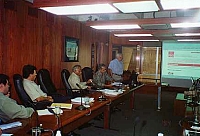
Talking about FIG. |
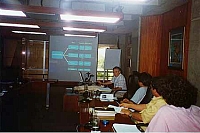
Prof.
Navarrete explaining the Chilean situation. |
|
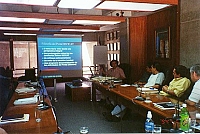
Mr.
Lebeau talking about Guatemala project |
|
Goals of the meeting
The main goals of the meeting were:
- To study and analyze documentation collected from universities and
associations
- To learn the state of the art in education and the profession in each
Latin American country
- To exchange experience from each country concerning strategies
developed for defending our profession
- To try to prepare a scheme for minimum common curriculum for the
continent
- To define the contents of the final report
Definition of the professional profile
Based on the professional reality of today and the foreseeable trends and
needs in the future, in particular, and bearing in mind both pillars of our
profession, following “professional field of activity” or “professional
profile” were designed as a desirable, suitable and necessary goal for
the near future:

Draft of curriculum
To fulfil the requirements of the professional profile, it was agreed
that it would be of interest for the different governmental, academic and
professional authorities to have a draft of a common core curriculum with
subjects, which – as minimum - should appear in the different syllabuses.
The proposed syllabus was divided into four different categories of
subjects:
- Basic subjects
- Basic subjects for Engineering and Surveying
- Specific subjects for Surveying and Agrimensura
- Complementary and Humanistic subjects
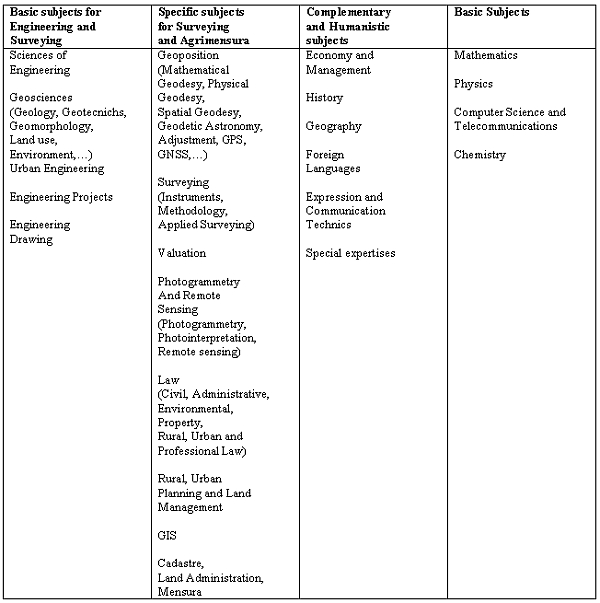
Final report
The Network defined and approved the contents of the final report to be
published at the 4th FIG Regional Conference to be held in September/October
2005 in Latin America.
- Introduction
- State of the Art
a) Profession
b) Studies
- Professional Profile for the 21st Century
- Draft for a new common core curriculum
- Comparative analysis
- Conclusions
a) Similarities and dissimilarities between the new and the old curricula
b) Needs and lacks
c) Proposal of “harmonization”
Conclusions
- There is a deep conviction that today’s situation is undesirable for
everybody, for professionals, associations and universities, especially
when the globalization process brings so many problems but also
opportunities.
- There is a strong wish for having curricular harmonization to some
extend, which can facilitate mobility within the continent.
- There are big expectations that this Educational Network can seriously
help different countries, universities, associations, professionals,
professors and students in Latin America to a better understand and learn
from each other; and, consequently, to facilitate access to graduate,
Master, PhD and CPD courses within the continent with much less problems
(economic, linguistic, idiosyncratic etc.) than when going outside Latin
America.
- It is fully acknowledged that this Network shall become a permanent
forum for all Latin American colleagues, where they are able to make
contacts, exchange their experiences, discuss problems and their
solutions, and reinforce the links among themselves and widen these
experiences to sister associations and universities in the Caribbean,
although not Spanish speaking countries, as well as to the North American
countries, if needed and suitable.
Finally, it is import to notice that the O.N.U. approved to work in
Mexico to establish an Institute of Land Organization. This Institute will
cover Latin America and start its work this year.
Prof. Pedro Cavero
Chair of FIG Commission 2
Prof. Graciela Loyácono
Chair of Comm. 2 Chair of W.G. 2.2
Ing. Juan Manuel Castro Alfaro
President of the Colegio de Ingenieros Topógrafos, Costa Rica
MA Luis Fernando Ramírez Arguedas
Secretary General of CFIA |

